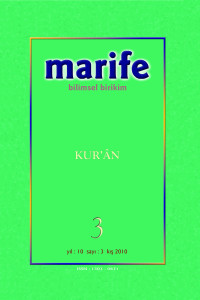Abstract
Ahmad Ibn Ajiba al-Hasani (d. 1224/1809) was a scholar, saint and mufassir
who grew up in Morocco. With almost fifty works on various subjects, Ibn Ajiba
is better known in Turkey for his Sufism side and his works on tasawwuf. As well as
being a great scholar and a murshid (spiritual guide), Ibn Ajiba’s work entitled alBahru’l-Madid
fi Tasfiri’I-Qur’ani’l-Majid is an original tafsir (commentary) of the
Quran from start to finish, combining the methods of dirayah and isharah. He has
also written other works in the field of tafsir. Our article deals with the life and
works of this multi-faceted scholar, whose entire life was devoted to knowledge,
awareness and guidance; as well as this, it explores his tafsir and tafsir methodology,
which sheds new light on the ishari method of tafsir in particular.
Abstract
Ahmed İbn Acîbe el-Hasenî (ö. 1224/1809), Fas'ta yetişmiş âlim, arif ve müfessir bir zattır. Değişik alanlarda elliye yakın eseri bulunan İbn Acîbe, Türkiye'mizde daha çok sûfilik yönü ve tasavvuf alanındaki eserleriyle tanınmaktadır. Kendisi büyük bir âlim ve mürşit olduğu gibi, aynı zamanda bir müfessir olan İbn Acîbe'nin elBahrü'l-Medîd fî Tefsiri’l-Kur'âni'l-Mecid adlı eseri, Kur’ân’ın başından sonuna kadar dirayet ile işaret metodunu birleştiren orijinal bir tefsirdir. Onun tefsir alanında başka eserleri de mevcuttur. Makalemiz, ömrünün tamamı ilim, irfan ve irşatla geçen bu çok yönlü âlimin hayatı ve eserleri yanında, özellikle işârî tefsire yeni bir çehre kazandıran tefsirini ve tefsirdeki metodunu konu etmektedir
Keywords
Details
| Other ID | JA67PZ47SJ |
|---|---|
| Journal Section | Research Article |
| Authors | |
| Publication Date | December 31, 2010 |
| Published in Issue | Year 2010 Volume: 10 Issue: 3 |
This work is licensed under a Creative Commons Attribution-NonCommercial 4.0 International License.

